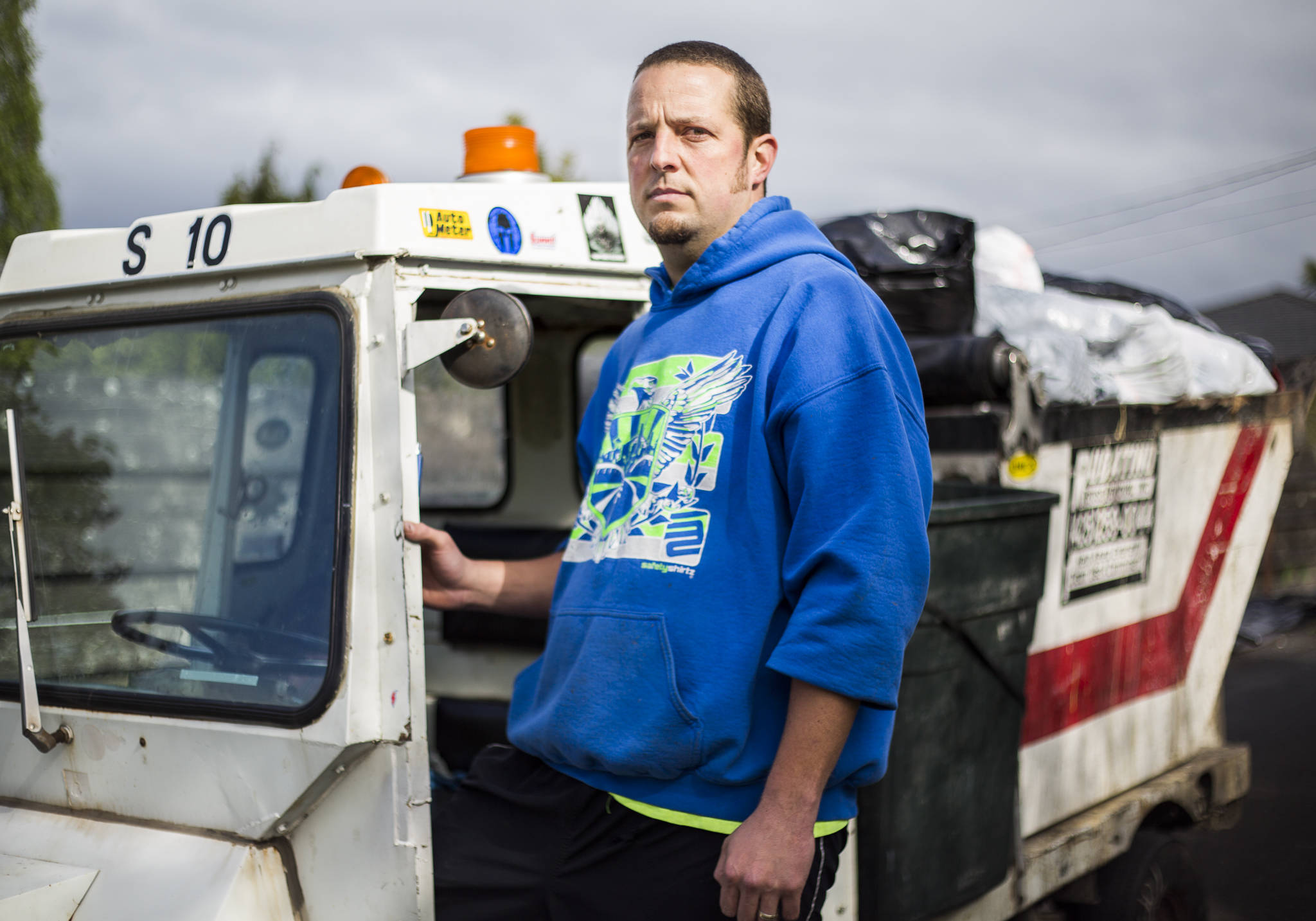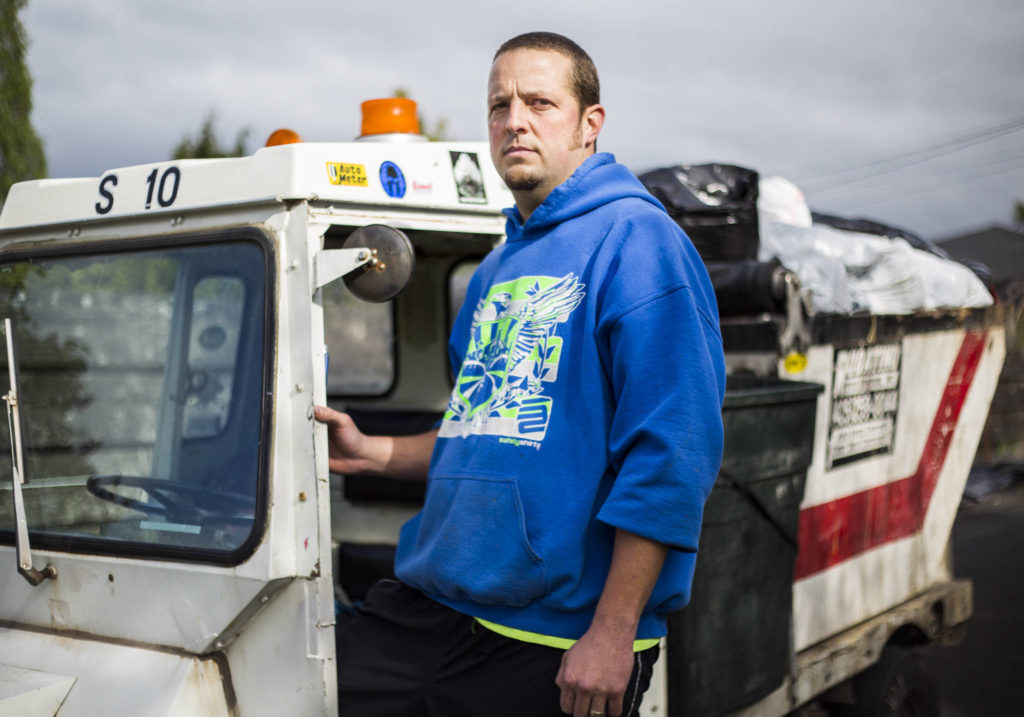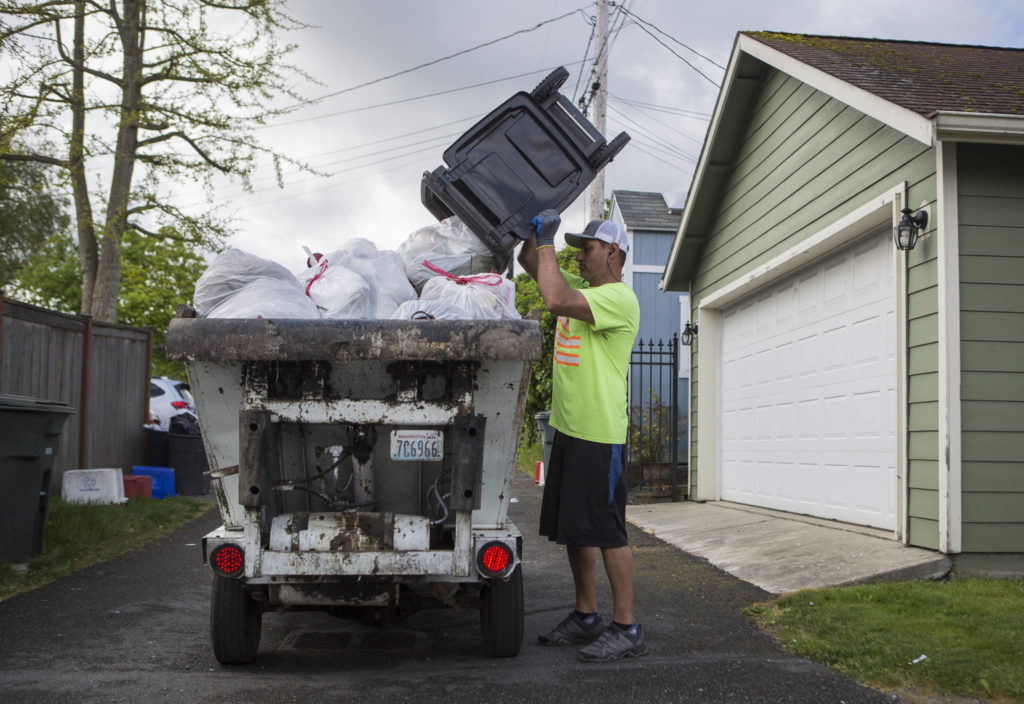This is one of several stories about essential workers during the COVID-19 outbreak. They might not be true first responders, but we couldn’t live without them.
EVERETT — What Joe Oltman wants these days isn’t much different from what Joe Oltman wanted before the COVID-19 outbreak.
“Just bag your garbage. That would be nice,” Oltman said.
“If we don’t have to pick up that stuff — it’s so much safer.”
Oltman has been a trash hauler and garbage collector for Rubatino Refuse Removal for 13 years.
The Everett company has been in business since 1907. There are only three days a year it doesn’t pick up — Thanksgiving, Christmas and New Year’s Day.
How essential are garbage collectors?
For starters, the 20th century is known for the flowering of public sanitation. In 1880, less than a quarter of American cities had any kind of organized solid waste collection system. By 1910, the percentage had risen to 80%. Without them, public health efforts to eradicate disease were often ineffective.
At Rubatino’s business, it’s business as usual during the coronavirus outbreak, said Ed Rubatino, 89, the company’s president — although some things have changed.
With more people sheltering at home, residential trash cans and dumpsters are piling up higher and faster, said Tim Schreiber, route foreman.
And it’s not just garbage in the garbage.
It’s stuff people are culling from their closets and drawers and chests, said Schreiber.
Call it what you will — tidying, stuck-at-home syndrome — it’s driving people to clean out closets that haven’t seen sunlight in a decade.
Toys, suits with shoulder pads, patio furniture and grandma’s couch are finding their way into the trash. (And then the perpetrators brag about it on social media.)
In some high-density neighborhoods, it’s particularly acute.
“The apartment houses are really getting hammered right now,” Schreiber said. ”They’re asking for more pick-ups.”
Still, if that’s what it takes to get you through the lockdown, tossing and tidying — not a problem. Keep it up. In fact, kick it up a notch.
“We’ll take mattresses and couches and washers and dryers,” said Schreiber. “Ed wants us to try and not say no to anything.”
But remember that one thing: Put the garbage in a bag. “If everything is bagged and we’re not picking up loose material — we hope everyone is going to be OK,” he said.
Rubatino also provides commercial service, but with many businesses and restaurants closed, the loads are lighter.
A full-time worker whose only job is hauling rubbish from Boeing’s sprawling Everett campus recently found himself with some down time.
“He was hauling 12 to 14 loads daily of these huge containers, 8 feet by 22 feet, the size of half a train car,” said Schreiber. “You hook the whole thing up and take it to the dump.”
When the jet manufacturer shut its factories for three weeks, though, the number dwindled to only seven or eight containers a week.
So, he helped out the commercial crew, which helped out the residential crew, said Schreiber.
On a recent morning, Oltman and his co-worker, Tony Ubhi, parked the golf-cart-sized trash haulers they were driving and took a moment to chat. The scooters can clear tight alleyways and residential streets. The trash is then off-loaded onto a big red garbage truck that follows them.
Oltman scoffed a bit at the term “essential worker.”
“Hey, I’m a garbage man,” he said, holding out a pair of gloved hands and grinning.
Their route that day stretched from East Marine View Drive in North Everett to 41st Street.
Their day had begun at 6:30 a.m. and would end at 2 or 2:30 p.m. A good day? No rain, said Ubhi.
The best part of the day? Going home, laughed Oltman. “I live in a house on five acres.”
Are they worried about being infected by the novel coronavirus?
Sure. But their biggest worry has been — and is — the fear of being stuck by a used needle.
Which goes back to their plea for folks to please bag their garbage.
“You’d be surprised how many people don’t,” said Oltman.
Still, they consider themselves lucky.
“You know what the best thing about this job is?” asked Oltman. “Me and Tony have a steady paycheck. We’re able to come to work and get a paycheck. There are some people that don’t have that right now.”
Janice Podsada; jpodsada@heraldnet.com; 425-339-3097; Twitter: JanicePods
Talk to us
> Give us your news tips.
> Send us a letter to the editor.
> More Herald contact information.



























